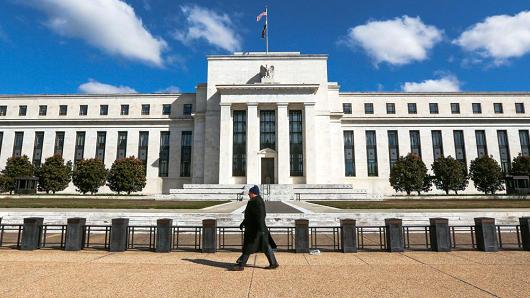
The Federal Reserve is due to announce another rate hike this Wednesday and won’t take any notice of the spat between the U.S. and its Western allies over trade tariffs, an economist told CNBC Monday.
Market players are monitoring the rhetoric surrounding trade between the U.S. and the other six world-leading economies after divergences at the Group of Seven (G-7) summit over the weekend.
U.S. President Donald Trump revoked his support for a joint statement after the meeting, following comments from Canadian Prime Minister Justin Trudeau. The latter said though he did not want to “punish American workers”, he would be pressing ahead with retaliatory tariffs against the U.S.
As a result, President Trump called Trudeau “dishonest and weak” and warned the other G-7 leaders that retaliation against his tariffs on steel and aluminum imports, first announced in March, would be a mistake.
However, the trade tensions are likely to be ignored by the Fed given the positive economic data in the U.S., according to Jim O’Sullivan, chief U.S. economist at High Frequency Economics, who told CNBC that the Fed meeting “will almost certainly result in another rate hike, along with the message that continued tightening is likely.”
Speaking to CNBC’s Squawk Box Europe, O’Sullivan said that the G-7 leaders “are playing with fire here in terms of all the protectionist talk. The hope is, in the end, that a serious trade war is averted, not to say that there won’t be tariffs on a small amount of goods compared to the overall size of the economy.”
Earlier this month, data showed that the U.S. economy added 223,000 jobs in May. Economists had estimated 188,000. Last week, initial claims for state unemployment benefits also decreased 1,000 to a seasonally adjusted 222,000 — economists had estimated an increase. The positive data has confirmed expectations that the Fed is on track to deliver another rate hike this Wednesday.
“The Fed is expected to raise policy rates by 25 basis points. That’s largely priced in,” Tai Hui, chief market strategist at J.P. Morgan Asset Management told CNBC via email Monday. “More importantly, its updated projections on growth, inflation, jobless rate and policy rate will be closely scrutinized,” he said.
However, experts warn a potential trade war carries risks for global growth and markets.
“The biggest source of downside risk here … is a trade war mongering… It is disturbing the way this is developing,” O’Sullivan told CNBC.
“Without all this trade mongering, the U.S. equity market would be higher than what it is today, and maybe the economic numbers would be even stronger than what they are, but the net result is, the U.S. economic data continue to be strong, more than strong enough to keep the employment rate coming down,” O’Sullivan said.
Commenting on the G-7 meeting, Hui said “business confidence and, subsequently, capital spending is at risk if this (trade) tension continues through the summer. This could cast a long shadow over global growth, which has rebounded in recent weeks after a soft start to the year.”

